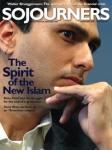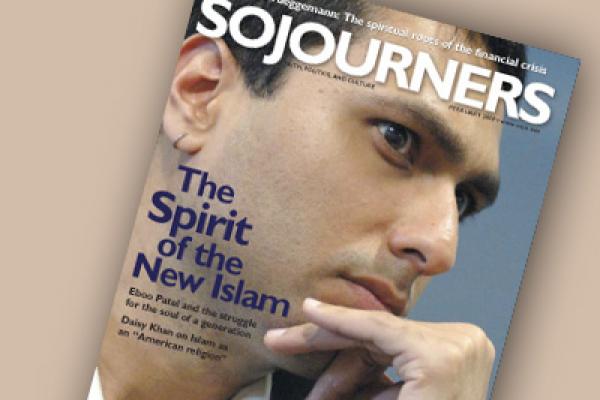ONE EVENING LAST NOVEMBER, Connie Borbeau encouraged several people gathered in a church parlor to talk about what, for many, is a frightening and deeply isolating topic.
“How is the economic crisis personally touching you?” Borbeau asked.
Borbeau was facilitating the first gathering of a “common security club” at her church in Concord, New Hampshire. These clubs, a cross between a study circle, mutual aid association, and social action affinity group, are a concept being piloted cooperatively by a loose coalition of organizations that includes the Institute for Policy Studies (IPS) and On the Commons.
After 20 minutes of talking in pairs, Borbeau asked if anyone was willing to share with the larger group.
“I work in elder services,” said a woman in her 30s. “My agency is about to eliminate 20 jobs because of state budget cuts. I live alone and I’m afraid I might lose my job and my apartment.”
“I’m afraid to open my mail,” nervously laughed a woman who worked as a middle-school teacher for three decades. “I don’t want to see how much my retirement savings have evaporated.”
“Winter is coming and I haven’t insulated my attic,” said a man in his mid-50s. “I hurt my back and can’t do the work. It would save me hundreds of dollars.”
“They foreclosed on the building my sister was living in—and she’s about to be evicted,” shared a man in his 20s. “She’s coming to live with me!”
From the dozen anxious stories, it was apparent that the economic crisis was touching everyone in some way.
The dominant messages in the U.S. economy are “you are on your own” and “some people are going to be left behind.” Countering this isn’t easy. For many, talking about their economic anxiety and asking for help is difficult and shaming. But to survive the coming period of uncertainty, we must regain use of our mutual-aid muscles, many of which have atrophied from lack of use.
As the economic crisis deepens, our churches are places where people can come together—not only to share one another’s concerns, but as centers of education, support, and social action. Organizers see common security clubs as one way to facilitate this work in congregations, as well as in union locals, women’s groups, and in other civic and social groups.
The need is undeniable. In the coming year, the financial crisis will likely worsen and personal economic security will further erode for millions of households. People living in poverty will find the avenues to escape more difficult. Young people will find entry- level jobs filled with people who lost higher positions. Unemployment will rise and more people will lose their homes, max out their credit cards, and face financial ruin. Others will see their small businesses stretched and their financial retirement nest eggs evaporate along with their hopes for a stable, middle-class standard of living.
A troubling number of people will face these challenges in isolation. Even those connected to religious congregations, unions, and civic groups may be embarrassed or ashamed to reach out for help. According to a Duke University study, 25 percent of U.S. citizens say they have no one to confide with about personal troubles—more than double the number who were similarly isolated in 1985, two decades earlier.
In a Nov. 16, 2008, article titled “Depression 2009: What would it look like?” Boston Globe journalist Drake Bennett writes that an economic downturn today would be largely characterized by isolation. “In precarious times, hunkering down can become not simply a defense mechanism, but a worldview.”
On the other hand, the economic crisis has politically engaged people in dramatic ways. The $700 billion bailout of Wall Street generated more calls to Congress than any issue in decades. A prolonged economic crisis will sustain public attention and create a teachable moment about the roots of the economic and ecological crisis.
Indeed, for a growing number of faith communities, the economic crisis is a catalyst for action and spiritual reflection, a chance to consider what is most vital. “The church has a pastoral and prophetic role around this economic crisis,” said Rev. Cecilia Kingman, pastor of a church in Edmonds, Washington, that is piloting a common security club. “Most of us feel the economy is something that acts on us. We need to find our voice and agency—to realize we can act to make the economy more just.”
THE COMMON SECURITY CLUB model was born out of work done in the last few years by people struggling with overwhelming indebtedness. Participants spend some time discussing the root causes of the economic crisis, drawing on readings and materials provided by the network. But they mostly focus on what they can do together to increase their economic security and press for policy changes.
“What becomes clear to participants is we are facing some major economic and ecological changes,” said Andree Zaleska from the Boston office of IPS, who is coordinating clubs in the Northeast. “We are not going back to some golden age of economic growth based on empire, unfettered capitalism, and cheap energy—nor do we want to! We have to prepare ourselves and our communities for transformation.”
As theologian Walter Brueggemann writes (see “From Anxiety and Greed,” page 20) we need to shift from “autonomy to covenantal existence, from anxiety to divine abundance, and from acquisitive greed to neighborly generosity.” Common security club participants are experimenting with ways to make the practical, political, and spiritual changes this entails.
The three main functions of the clubs are:
1) Learn and reflect
Through popular education tools, videos, Bible study, and shared readings, participants increase their understanding of the larger economic forces on our lives. Why is the economy in distress? How did these changes happen? What are the historical factors? How does this connect to the global economy? What are the ecological factors contributing to the changes? What is our vision for a healthy, sustainable economy? What are the sources of real security in my life?
2) Mutual aid and local action
Through stories, examples, Web-based resources, a workbook, and mutual support, participants reflect on what makes them secure. What can we do together to increase our economic security at the local level? What would it mean to respond to my economic challenges in community? How can I reduce my economic vulnerability in conjunction with others? How can I get out of debt? How can I help my neighbor facing foreclosure or economic insecurity? Can I downscale and reduce my consumption and ecological footprint and save money?
3) Social action
The economic crisis is in part the result of an unengaged citizenry and government. What can we do together to build an economy based on building healthy communities rather than shoring up the casino economy? What public policies would make our communities more secure? Through discussion and education, participants might find ways to engage in a larger program of change around the financial system, economic development, tax policy, and other elements of our shared economic life.
Clubs can be autonomous or affiliated with an existing institution, secular or grounded in religious values. The ideal size is 10 to 20 adults who make a commitment to an initial five meetings with a facilitator. Clubs then decide whether to continue meeting and self-manage. Starter sessions have been developed and include “The Roots of the Economic Crisis,” “Personal Responses to Economic and Ecological Change,” “Things We Can Do Together,” and “Actions to Transform the Economy.”
Among the things “we can do together,” the clubs examine stories and examples of various economic and mutual aid activities. These have included teaming up to help each other weatherize their homes, helping each other rework their personal budgets and reduce debt, and forming food-buying clubs. Faith-based groups weave together reflection, prayer, and action.
“We can’t be a bank for each other,” said club participant Paul Monroe of Boston. “But there are so many things we can do to support one another and increase our economic security.”
One group, convened by a group of Haitian women in the Boston neighborhood of Dorchester, decided to push back against their credit card companies. “Everyone was paying really high fees,” observed Charlotte Desire, who coordinated the group. “One of our best moments was when everyone in our group called their credit card company and threatened to cut up their cards unless fees were waived and interest rates were cut.” Almost everyone in the group was able to save hundreds of dollars in interest payments and fees.
Gerald Taylor, a veteran congregation-based organizer in Charlotte, North Carolina, has led discussions with several groups about what a healthy and democratic debt system would require. “All our religious traditions have prohibitions on usury for a reason,” said Taylor. “So what would a fair and transparent credit system look like?”
“We are piloting about a dozen common security clubs in different places and with very different groups,” said Zaleska, describing the efforts in her region. “We’re testing out several different curricula. Some clubs are pressing members of Congress to reform the casino economy, stop foreclosures, and pass an economic stimulus package.”
Whatever shape or focus members choose to take, common security clubs are pushing against the social isolation that may accompany a recession or depression. “I see the hurt and anxiety in my congregation—and how people privatize their pain,” says Cecilia Kingman. “This is a chance for us to be real with each other.”
These clubs are also one of many building blocks that can move us toward a “solidarity economy” that affirms our true interconnection with one another. Coming together is a way to remind ourselves of the abundance we have, the wealth of our relationships and networks, and the mutuality of our economic security.
As Connie Borbeau told the people gathered in that Concord church, “Let us pray together that our private pain now becomes our shared concern, that together we find ways to overcome our fear and anxiety, and be present to one another. Let us not be afraid, but take action together.”
Chuck Collins is a senior scholar at the Institute for Policy Studies, where he directs the Program on Inequality and the Common Good (www.extremeinequality.org). He is co-author with Mary Wright of The Moral Measure of the Economy (Orbis, 2007).

Got something to say about what you're reading? We value your feedback!
